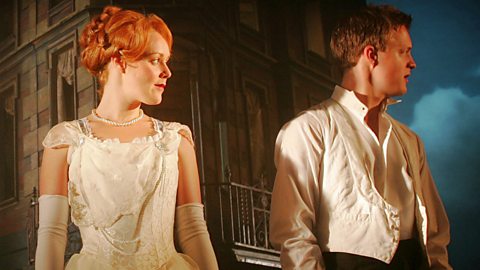Age in An Inspector Calls

Age is an important theme in An Inspector Calls. Priestley uses it to show how he believed that there was hope in the younger generation's ability to learn and change.
The older characters' opinions and behaviours are stubbornly fixed. Mr Birling refuses to learn and Mrs Birling cannot see the obvious about herself and her children. Eric and Sheila however are younger - they accept their mistakes and offer the chance for a brighter future.
How is the theme of age shown in the play?
In An Inspector Calls, Priestley explores the theme of age through:
- Sheila and Eric's response to Eva's death
- Mr and Mrs Birling's response to Eva's death
- how the older characters perceive the younger ones
| How does Priestley show this? | Evidence | Analysis | |
| Sheila and Eric | Eric stands up to his parents when it becomes clear that they will not take responsibilty. | "You’re beginning to pretend now that nothing’s really happened at all." | Eric sees that his parents are trying to 'pretend' that nothing happened when it is suggested that the Inspector was not real. He and Sheila, the younger characters, still feel responsible. |
| Mr and Mrs Birling | Mrs Birling explains her decision to turn away Eva when she came to her for help. | "So I was perfectly justified in advising my committee not to allow her claim for assistance." | Despite hearing about all the misfortune that Eva Smith has suffered, Mrs Birling is unmoved and stubbornly stands by her decision to turn Eva away. |
| Older Vs younger | Mr Birling turns on his son Eric and nearly attacks him physically. | "Why, you hysterical young fool - get back - or I'll -" | Mr Birling implies here that Eric is a 'fool' because he is young. Ironically, it is the older Arthur who nearly resorts to physical violence. |
| Sheila and Eric | |
|---|---|
| How does Priestley show this? | Eric stands up to his parents when it becomes clear that they will not take responsibilty. |
| Evidence | "You’re beginning to pretend now that nothing’s really happened at all." |
| Analysis | Eric sees that his parents are trying to 'pretend' that nothing happened when it is suggested that the Inspector was not real. He and Sheila, the younger characters, still feel responsible. |
| Mr and Mrs Birling | |
|---|---|
| How does Priestley show this? | Mrs Birling explains her decision to turn away Eva when she came to her for help. |
| Evidence | "So I was perfectly justified in advising my committee not to allow her claim for assistance." |
| Analysis | Despite hearing about all the misfortune that Eva Smith has suffered, Mrs Birling is unmoved and stubbornly stands by her decision to turn Eva away. |
| Older Vs younger | |
|---|---|
| How does Priestley show this? | Mr Birling turns on his son Eric and nearly attacks him physically. |
| Evidence | "Why, you hysterical young fool - get back - or I'll -" |
| Analysis | Mr Birling implies here that Eric is a 'fool' because he is young. Ironically, it is the older Arthur who nearly resorts to physical violence. |
Analysing the evidence
Question
How are the younger Birling’s, Sheila and Eric, different to their parents in An Inspector Calls?
- Mr and Mrs Birling are both unrepentantBeing without remorse or regret. about their involvement in Eva's death.
- Sheila and Eric develop a sense of social responsibility during the course of the play.
- Sheila and Eric are ashamed about their involvement in the death and are desperate to make amends.
- When Gerald suggests that the Inspector was not real, Mr and Mrs Birling are over the moon that they could be 'off the hook'. However, Sheila and Eric are convinced that even if the Inspector was not real and a girl didn’t die, they still behaved badly and should change their ways.
The older characters are painted in a more negative light and they don't learn from their mistakes. The younger characters admit they were wrong and try to make things better.